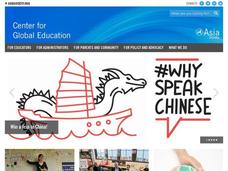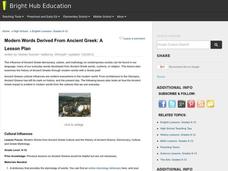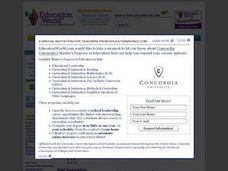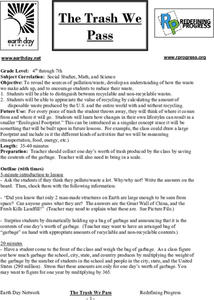Curated OER
Mapping Perceptions of China
Pupils discuss what types of things are included on a map. They compare and contrast maps of China with a map they create and practice using different types of maps. They write analysis of their classmates maps.
Curated OER
Geography and Culture of China
Take out a map, a paper, a ruler, and those coveted colored pencils for a lesson on Chinese culture and geography. This is a multifaceted approach to basic geography skills that incorporate story telling, class discussion, primary source...
Curated OER
Earth and Sun's Distance
Students consider the shape of the Earth's orbit around the Sun. They view the first segment of Science Court video and use Timeliner software to construct a scale of the distance between the Earth and the Sun.
Curated OER
Looking Into the Mirror
Learners survey the impact of racial, cultural, and/or socio-economic intolerance in their own lives in relation to other individuals. They develop written and oral proposals to solve inequality and intolerance on a local, state,...
National Endowment for the Humanities
Lesson 3: On the Road with Marco Polo: From Hormuz to Kashgar
Young explorers examine the route that Marco Polo and his father traveled to reach China. They examine online maps of the Silk Road and harsh terrain of Afghanistan to determine challenges that may have been encountered during travel.
Curated OER
Contemporary Chinese Ink Painting
Students explore China and analyze Chinese Ink Painting as well as incorporating poetry into artwork. With the theme of "Peace" as their foundation, in groups they practice painting bamboo with an original Quatrain poem.
Curated OER
The Trash We Pass
Where does our garbage go? What is the difference between a recyclable and non-recyclable item? Pose these important, but often overlooked, questions to your class and invite them to consider the lasting and damaging effects of the...
Curated OER
Working Watermelon
You're going to wish you had a watermelon for this lesson! Class members read about watermelons and make a salad in class to sample. They also perform estimates, measurements and calculations on a watermelon. They predict what percentage...
Curated OER
Acids and Bases
Students use supporting evidence to predict if common household substances are acids or bases. They determine the pH of the substances and describe the results of the investigation and characteristics of each substance.
Curated OER
Annotating Change in Satellite Images
Students construct a movie using Landsat images to observe changes over time on Earth. In this satellite images lesson, students observe changes in land use over time and document one type of change they observe. They produce an...
Curated OER
Ancient Greece
Students explore the origins of modern language. In this etymology lesson, students discuss the cultural influences of Ancient Greece on modern society. Students design and complete charts that demonstrate the original and contemporary...
Curated OER
Make A Mummy: The Science of Mummification
Learners research the history of mummification. They work together to create an apple mummy. They write a paragraph about what they gathered while doing the experiment.
Curated OER
Math with Maps and Globes
Students round out their math skills with these ‘round the world' ideas. In this math and geography lesson, students try out time zone sticks, a polar race, and tic-tac-globe to engage them in learning more about globes and the...
Curated OER
Discovering Math Concepts in Advanced Algebra
Young scholars explore the concept of Chinese contributions in mathematics. In this Chinese contributions in mathematics lesson, students research Chinese achievements in mathematics. Young scholars solve 3x3 systems of equations using...
Curated OER
Mongolia: Land, History and Culture
Students examine the land, culture and history of Mongolia. In groups, they use the internet to determine what groups held power and during what time periods. They also identify the most important parts of their culture and why they...
Curated OER
THe Trash We Pass
Students identify the sources of pollution and waste in their community. They examine the process of recycling and how to eliminate some of their family waste.















